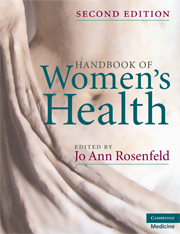Book contents
- Handbook of Women's Health
- Handbook of Women's Health
- Copyright page
- Dedication
- Contents
- Contributors
- Section 1 Introduction
- 1 Introduction
- Chapter 2 Preventive health care for older women
- Chapter 3 Nutrition
- Chapter 4 Physical activity and exercise
- Chapter 5 Psychosocial health of well women through the life-cycle
- Section 2 Sexuality
- Section 3 Genitourinary concerns
- Section 4 Breast disorders
- Section 5 Psychological concerns
- Section 6 Common medical problems
- Index
Chapter 3 - Nutrition
from Section 1 - Introduction
Published online by Cambridge University Press: 26 December 2009
- Handbook of Women's Health
- Handbook of Women's Health
- Copyright page
- Dedication
- Contents
- Contributors
- Section 1 Introduction
- 1 Introduction
- Chapter 2 Preventive health care for older women
- Chapter 3 Nutrition
- Chapter 4 Physical activity and exercise
- Chapter 5 Psychosocial health of well women through the life-cycle
- Section 2 Sexuality
- Section 3 Genitourinary concerns
- Section 4 Breast disorders
- Section 5 Psychological concerns
- Section 6 Common medical problems
- Index
Summary
- Type
- Chapter
- Information
- Handbook of Women's Health , pp. 25 - 42Publisher: Cambridge University PressPrint publication year: 2009

